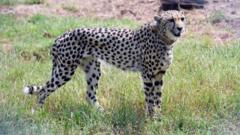Authorities at Kuno National Park in India are taking disciplinary actions against a forest worker who was caught on video providing water to a cheetah and her cubs. The footage went viral online, prompting divisive opinions regarding the appropriate interaction between humans and wildlife.
The worker, who serves as a driver at the sanctuary, violated strict protocols that permit only trained personnel to approach these large cats. Cheetahs were declared extinct in India in 1952, making them the only large mammal to vanish since the country gained independence. In an effort to repopulate the species, cheetahs were reintroduced to Kuno National Park in 2022.
The incident surfaced on Sunday, igniting discussions and concerns online. The video depicts the man pouring water into a pan, encouraging Jwala, a cheetah, and her four cubs to come closer. Officials explained that while some staff might try to lure cheetahs back into the forest to prevent human-wildlife conflicts, only trained individuals are authorized to undertake such tasks.
Uttam Kumar Sharma, Additional Principal Chief Conservator of Forests, emphasized the importance of adhering to established guidelines. He stated, "There are clear instructions to move away from cheetahs. Only authorized persons can go in close proximity to them to perform a specific task."
Initial reactions to the video were overwhelmingly positive, described as "heartwarming," but many voiced apprehensions regarding safety for both humans and animals. Suggestions emerged advocating for the creation of ponds within the park to ensure water access, reducing the risk of cheetahs venturing too close to human settlements.
Tensions have arisen in villages bordering the park, especially following instances of cheetahs attacking livestock. Some villagers have resorted to throwing stones to deter the cats. Park officials are actively working to raise awareness and promote coexistence among local communities and the returning wildlife.
In a historical move, 20 cheetahs were relocated from South Africa and Namibia to Kuno between 2022 and 2023—the first instance of such a transcontinental effort. Out of these, eight have died due to various causes, leading to discussions about the adaptability of these animals to their new environment. Concerns have been raised by experts about monitoring practices, veterinary care, and the overall management capability of the park staff.
Despite facing criticism, park authorities report that the current cheetah population stands at 26, including 17 in the wild and nine in enclosures. Plans are already underway to bring an additional 20 cheetahs from South Africa this year.


















